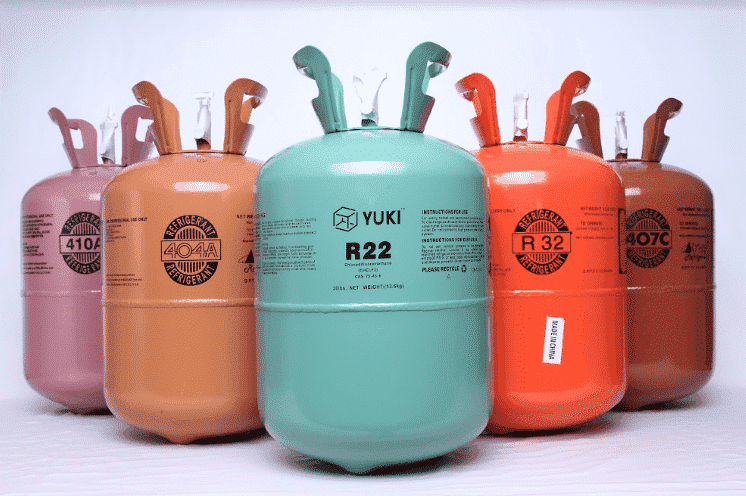Can I Mix Different Refrigerants?
You’re wondering if you can mix different refrigerants for your air conditioning system. The short-long-only answer is no, never. There are many reasons why it’s impractical, illegal, and not economical for a homeowner to mix refrigerant types.
CFC-type refrigerants like R-22 – the most popular in the United States by far – are a single type of refrigerant. CFC stands for chlorofluorocarbons. These refrigerants contain chlorine, fluorine, and carbon. HCFC, a “replacement” refrigerant used in place of R-22, is also made up of chlorine, fluorine, and carbon, but contains a hydrogen atom. Any HCFC is going to be a mixture of several types of HCFC refrigerants. The chemical makeup of replacement refrigerants is designed to mimic the operating pressures and temperatures of R-22. These replacement refrigerants work okay when they’re operating in an isolated system with no contaminants or other types of refrigerant, but should never be used to “top off” a system that’s low.
PHASING OUT R-22 REFRIGERANTS
Because R-22 depletes the ozone layer, production and import of the refrigerant was further limited in 2010. According to the Environmental Protection Agency (EPA), in 2020, R-22 will no longer be produced or imported. After 2020, only recovered, recycled, or reclaimed supplies of R-22 will be available. Due to the EPA phasing out R-22, it’s important that you stay informed on how you should service, repair, or replace your air conditioning unit that uses the refrigerant.
Note that when the refrigerant in your AC system is running low, you may not be able to replenish it because supplies of R-22 will become more limited and the price may increase due to a limited supply. When working with a contractor, it’s important to make sure they’re checking for leaks and repairing them instead of “topping off” your system as a quick remedy. Also, be sure to check what refrigerant they’re using to replenish your system’s supply because mixing is never a good idea.
WHAT CAN HAPPEN TO MY SYSTEM IF I MIX REFRIGERANTS?
Operating pressures and temperatures will definitely change for the worse. The different types of refrigerants are not meant to be mixed. The refrigerant charge must be optimized by using the refrigerant’s respective pressure-temperature chart. But when mixing an alternative refrigerant with R-22, there’s no pressure-temperature chart you can refer to. This means that you can’t optimize the system charge, which can lead to overheating and reduced system efficiency and lifetime.
A loss of efficiency will occur. There may be an unpredictable and extreme change in efficiency as most R-22 refrigerants do not operate as efficiently as R-22 even when it’s not mixed. An inefficient AC unit can result in higher energy costs because your system will work harder than normal to cool your home.
There may be damage to your unit. This happens due to the unpredictability of the pressures and temperatures as well as a potential loss of proper oil return to the compressor, which may result in your system’s failure.
Below are other effects of mixing refrigerants:
Ineffective compressor cooling
Reduced cooling
Possible compressor damage
Metering device malfunction
Inadequate oil return to the compressor
Negative impact on the environment
IS IT ILLEGAL TO MIX REFRIGERANTS?
The EPA isn’t likely to come banging on your door for mixing refrigerants, but even if they don’t, the environment is already under enough pressure with the use of refrigerants in their purest form. Our environment doesn’t need an unscrupulous contractor or technician mixing refrigerants. If refrigerants aren’t mixed together, they can be reclaimed and reused.
If they’re mixed together, the only option for the contractor is to turn the contaminated refrigerant over to a parts house at an additional cost. The parts house sends it to a company that incinerates the refrigerant, so it can never be reused.
WHY WOULD A CONTRACTOR MIX REFRIGERANTS?
The answer is cost. A 30 lb jug or R-22 can cost 3-4 times that of a replacement refrigerant. The contractor or technician that doesn’t care about you, your equipment, or the environment will “top-off” a system and get away before the homeowner ever notices the losses in system capacity or the damage being done to their equipment.
Other technicians really are misinformed and believe that replacement refrigerants can actually improve a system’s performance. But they fail to realize that they shouldn’t add replacement refrigerants to a system without first fully recovering, evacuating, and then replacing the refrigerant entirely. This is especially common during peak cooling months when the weather is warm. A contractor may take a shortcut and choose not to evacuate the system properly, leak check, fix, and then recharge the equipment.
ARE REPLACEMENT REFRIGERANTS ALL BAD?
No, they aren’t. They just shouldn’t be mixed with any other refrigerant. Before you or your contractor decides to use a replacement refrigerant, we urge you to read this article, which will tell you the replacement refrigerants we recommend and why. But always remember, the system has to be free of all other contaminants and refrigerants before using a replacement for R-22 or any other refrigerant.
As you know, mixing refrigerants is not good for anyone. The customer’s system will suffer from lost efficiency and decreased longevity for the equipment. The company can also suffer consequences because they’re doing something illegal. Once the customer finds out what happened, they’re unlikely to consider that contractor for future projects. Lastly, the environment is being harmed because something that could have been recycled now has to be destroyed.
It’s much easier, more cost-effective, and just the right thing to do to avoid mixing different refrigerant types. The earth will thank you, your equipment will thank you, and so will your power bills.
At LEGACY, we serve homeowners in the Las Vegas and Henderson areas. Anything from replacement and repair to general AC service and maintenance, we can deliver. Please give us a call at (725) 237-2441 if you have any questions concerning this article or if you ever need service.

